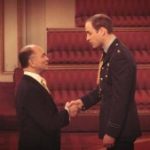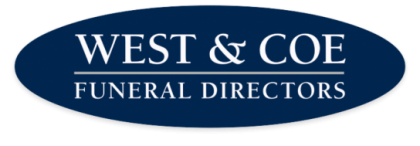
Our History
As the oldest funeral directors in Dagenham and, in fact, Dagenham’s oldest business, this company’s history is a unique record of past times.
However, we do not just look back: we also look forward to providing the community with the quality of service that has been the hallmark of our company since 1903.
The Early Years
West & Coe can trace its history back to 1903, when Edward John West and Harry Woolard Coe set up in partnership. In fact, their history of working together goes back further still, to 1896, when they both began working as apprentice carpenters under the watchful eye of Dagenham village builder and undertaker, George Pearcey. In these early days, West & Coe mostly built houses, many of which still stand today, including Wykeham Lodge, next to St Andrew’s Parish Church in Hornchurch. One of their first building commissions in 1903 was to build a wooden airship hangar; they also took down the spire of Dagenham Parish Church several years later.
Several years later, Mr West and Mr Coe took over George Pearcey’s business, which also meant taking over the ‘White House’, a building that would become home to both the company and the West family for more than sixty years. While the company continued its building work, it also shared Dagenham’s undertaking duties with another local undertaker, W Howgego.
With just 9,000 residents in the village, the two undertakers were able to conduct the fifty or so funerals required each year between them. One of the traditions of Dagenham village was that the death of a local person would always be signified by the tolling of the church bell, with a different style depending on whether it was a man, woman or child.
How Undertaking used to be
Until the Second World War the general public had little immediate contact with death, apart from within their own families and, consequently, the business of undertaking was looked upon as a necessity, but not one that was readily discussed.
It was normal, as most deaths occurred at home in those days, to deliver the coffin to the family home, where the deceased would remain until the funeral. This meant Mr. West and Mr. Coe would have to carry the coffin across paths and fields and often some distance to the home.
Boys from the village, including young Jack West, would follow them, carrying wooden trestles on which the coffin would be rested at convenient points along the away and once they reached the house. This procedure was usually done after dark to avoid upsetting people unnecessarily.
A few days later, on the day of the funeral, Mr West would dress in white cuffs, stiff collar, top hat and frock coat and return to the home of the deceased. He would lead the mourners walking in pairs behind the coffin, which was normally carried by friends or local men from the village, to the churchyard in Dagenham for the burial. He would then lead them back again afterwards. Having said his goodbyes, he would often walk back home with the wooden trestles over his shoulders. Occasionally horses were requested and, not having any of their own, West & Coe used those of J Cooper & Son, a Barking undertaker.
Burial was the accepted way for many years, which meant that London cemeteries were overcrowded. When called upon to go to one of these cemeteries, it was quite usual to join four or five other funerals for a communal service. At Abbey Park Cemetery, the ground was so valued that common graves were dug to a depth of 20 feet or more in order to receive ten or twelve coffins.
The first cremation in which West & Coe was involved took place in 1922, requiring masses of official documentation to be completed. It also required a special softwood coffin to be made, complete with as few nails and screws as possible. In these early days, logs from the cemetery trees would be used to fire the cremators.
Effects of population explosion
After the First World War, London County Council decided it needed more space to house its population, especially with soldiers returning home after several years’ fighting. It chose to build 25,000 new homes on Dagenham’s farmland, quickly transforming it from a small village into a large town, Taking over from the parish councillors in 1926, the new town councillors were very happy to see the old village disappear in order to unite the new town.
To cope with the growth in business, West & Coe opened its first branch at 2a Station Road (now Exeter Road). The building was a converted lean-to that had previously been used to garage the local fire engine. The White House remained head office to both the funeral and building business of West & Coe.
The new families who moved into the area brought their East End customs with them, including their unique funeral style, a style that Mr West and Mr Coe had to learn quickly. These funerals tended to be elaborate occasions, the streets lined with locals paying their respects and masses of flowers accompanying the procession. The distance back to London cemeteries meant that horses were required for the journey.
Although motor vehicles were rare in the undertaking profession, West & Coe started using a Daimler hearse in 1930. However, as years went by, it became difficult for firms to keep both horses and cars. The change to cars was a sad time for those undertakers fond of their horses. The onset of the war resulted in horses being frightened in the streets by the noise of bombs and guns.
In 1934, Jack West opened the company’s second branch at 2 Lodge Avenue, Dagenham. Jack ran this branch himself, while the building side of the business continued to be run by Jack’s brother, Coppen West, who was a highly talented and respected builder.
With the onset of the Second World War, Jack was told his position in the business was not essential and he was called up. The business ticked over while Jack was away in India until he returned home in 1945 to take up the reins again, complete with army-issue civvies and a booklet entitled, How To Settle Down Again In Civilian Life. This story, and many others, is recalled by Jack in two books he wrote in the latter years of his life: 60 Years With Funerals and Personal Memories of Dagenham Village.
Community and Growth
Soon after the end of the Second World War, the company bought the local Becontree Cemetery, known today as Eastbrook Cemetery. One of Jack’s first tasks was to arrange a memorial service for German airmen, a ceremony he recalled as very moving. Jack ran the cemetery until he sold it to the council in 1963.
West & Coe decided to build its first purpose-built chapel of rest in the grounds of the White House in 1955. Several years later, the building and funeral sides of the business were separated, with the funeral business retaining the West & Coe name. A period of expansion followed: the firm bought premises from local competitors H Woodcock, in Parsloes Avenue, Dagenham in 1963, which coincided with the closure of the Lodge Avenue branch. A new branch was also opened at The Broadway, Rainham in 1966.
Although the company’s head office premises had been expanded by the purchase and use of land near the White House, the council dealt the firm, and indeed the family, a major blow in 1967 when they put a compulsory purchase order on the White House and the surrounding land. Forced to move from the White House, West & Coe bought and transformed a grocery shop into their new head office at 630 Rainham Road South. Six years later, the company took over the business of another local competitor, AG Butler & Son. The original name was retained at two offices, while the Hornchurch office was immediately changed to West & Coe.
It was during this period of change and growth that the third generation of the West family, Jeremy, joined the business, aged 16.
Harry Coe died in 1950 and was not succeeded, although today his name proudly remains as an integral part of the company.
Drive towards modernisation
The most important development in the company’s recent history came when the company desperately needed larger premises and purchased a former DIY shop and yard almost adjoining the existing head office. When a surveyor reported back that the building at 620 Rainham Road South was in bad repair and would be better demolished, Jack and Jeremy West sat with some colleagues and drew up some ambitious plans. The impressive new purpose-built premises were completed and opened by the Mayor in 1982. This building was the first of its kind in Essex and contained all the facilities both the company and bereaved families could need.
Meanwhile, in 1981, the company opened premises in nearby Aveley and in 1985 moved to the next-door premises at Rainham, encompassing private chapels of rest within the building. Four years later, a large purpose-built funeral home was opened in Lodge Lane, Grays, followed in 1993 by a much-needed extension to the Dagenham Head Office.
In 1990 West & Coe acquired a new fleet of Daimler cars, comprising a hearse and five limousines. Over the last twenty-five years horse-drawn processions have seen a resurgence, with the company regularly carrying out two or three a week.
Embracing the Modern Era
In 1998 the company had the opportunity to purchase the business of James Hawes in Romford and Manor Park. A highly respected family business, it was formed at the same time as West & Coe. Also at that time the Parsloes Avenue Office was extended and refurbished.
Several years later, in 2001, the company acquired the business of J Perigoes and AW Court at Cranbrook, Beckley and Grafty Green in Kent. The proprietor of that business was well known to Jeremy West and was very keen for his respected business to continue to be looked after in a similar way in the future. These offices are run by experienced local staff but under the professional guidance of West & Coe.
West & Coe Centenary Year
2003 was the centenary of the family business and an exceptionally proud time for the West family. During the year a number of events were held to commemorate this milestone. These included hosting a bereavement seminar sponsoring Dagenham Town Show as well as a quite remarkable formal dinner held in a grand marquee at Central Park, Dagenham. Over 450 people attended this gala evening that relived the hundred- year history and was hosted by Linda Robson. A wonderful cabaret from Ronnie Corbett and further entertainment from the Dagenham Girl Pipers and various other bands followed. The following day the marquee was formed to give a church-like effect and a memorial service was held for families for whom West & Coe had carried out funerals. Over 600 people attended.
For some time the company had been conscious of the lack of local aftercare support for bereaved families. It was this reason that, in 2006, after a year of careful planning, the company proudly launched its own unique bereavement support programme. HOPE – or Helping Overcome People’s Emotions in Grief – is a six-week programme that combines education, communication and the ability to share one’s emotions. This special support is free to all and has helped many people come to terms with their loss.
West & Coe have always played an active part within the community, being involved in a number of charities as well as supporting many worthy local causes. The company has been a great supporter of Dagenham & Redbridge Football Club for many years and in 2006 they were approached to be the club’s main sponsor. As Dagenham’s oldest business, West & Coe were proud to become main sponsors and still remain so today. Within the first year, Dagenham & Redbridge Football Club were promoted to the Football League, a quite outstanding achievement for such a small club. Several years later, the club played at Wembley in the play-off final and won, meaning a promotion to Division One.
Over the last decade West & Coe have introduced Rolls Royce and Bentley vehicles and now have one of the most impressive fleets of prestigious funeral vehicles in the country.
The opportunity to further expand the business came in 2008 following the sale of a local family-owned business in Basildon to a PLC corporation. A well-known property at Old Bluehouse Farm in Pitsea was purchased. Today this exceptional old building houses a most impressive new funeral home, probably the best of its kind in Essex today.
As the company continued to grow, the fourth generation of the West family, Jeremy’s son Jamie, joined West & Coe in 2010. His dedication and commitment further enhances the quality of the family business.
Like previous acquisitions, West & Coe were approached by the family of another long-established business, J Jeffries & Son and William Denys. The two offices in Upton Park and Stratford were purchased in October 2012. A programme of refurbishment took place to ensure the company are able to meet the needs of the local communities.
In 2016, The long standing family business of HL Hawes Funeral Directors was purchased. The managing director was well known to Jeremy West and was very keen for his respected business to continue to be looked after in a similar way in the future. The offices at Barkingside, Chingford & Leytonstone are run by experienced local staff but under the professional guidance of West & Coe. The premises have undertaken a refurbishment throughout and with the introduction of new Jaguar vehicles we now offer families the highest standard throughout.
In 2019 there was another opportunity for expansion. This time with the purchase of Harwich & Dovercourt Funeral Service in Harwich and Kirby Cross & Frinton Funeral Service in Frinton on Sea.
Over the last decades West & Coe have received several honours in local business awards, winning the Customer Care Category in Basildon, Havering, Thurrock, East London and Barking & Dagenham, as well as being chosen as best business in the Essex Community at the prestigious Essex Business Awards in 2009.
Personal awards as well for Jeremy West such as Freedom of the Borough of Dagenham and in 2014 Jeremy West received an MBE from HRH Prince William at Buckinham Palace. This was recognition for his outstanding services to the funeral profession, the local community & charities.
Much has changed at West & Coe over the years but, equally, much has stayed the same: professionalism, high standards and compassion for families. With its vastly experienced and loyal members of staff, the company is proud to continue a tradition of service to its communities that began in 1903 and has never faltered.
Having been a founder member of the National Association of Funeral Directors in 1905, West & Coe was also instrumental in the recent formation of the National Society of Allied and Independent Funeral Directors, of which Jeremy West was the founder President. The company adheres strictly to its code of practice.
Today, Jeremy West is Chairman and Managing Director, while his mother Daphne and sister Jennifer sit alongside him on the Board of Directors, with fourth generations Jamie & Richard taking an active role in the day to day running. Despite now being one of the largest independent Funeral Directors in the country, West & Coe remains determinedly a family concern, aiming to continue to serve its communities with care, honesty and dedication.
Mr EJ West and Mr HW Coe form a partnership: West & Coe
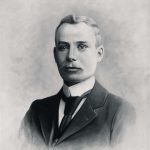
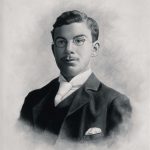
Move into the ‘White House’
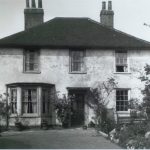
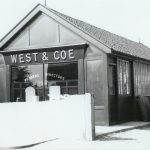
West & Coe’s first cremation
Premises open at 2a Station Road (now Exeter Road), Dagenham
Dagenham changes status from a village to a town following the building of 25,000 new homes
Jack West joins the firm at the age of 17
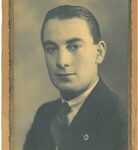
West & Coe’s first motorised funeral
Second West & Coe branch opens at 2 Lodge Avenue, Dagenham
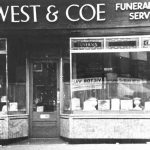
Purchase of Becontree Cemetery
Co-founder Harry dies and is not succeeded
First chapel of rest built in the grounds of the ‘White House’, Dagenham
The building and funeral sides of the business are split, with the funeral side retaining the name West & Coe
Acquisition of premises at 372 Parsloes Avenue, Dagenham by takeover of H Woodcock’s business
Sale of Becontree Cemetery
Branch opens at The Broadway, Rainham
Purchase of new premises at 630 Rainham Road South, Dagenham
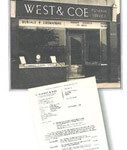
Borough Council puts compulsory purchase order on the ‘White House’
One of the business’s founders, Edward West, dies aged 91
Jeremy West joins the company, aged 16
West & Coe takes over AG Butler & Son’s business

Establishes a branch at High Street, Aveley
Moves into a purpose-built head office
Moves into new premises at Rainham
Jack West writes first book, 60 Years With Funerals

Opens new funeral home in Lodge Lane, Grays
A new extension is added to head office
Jack writes his second book, Personal Memories of Dagenham Village

Jack West dies, aged 83
West & Coe purchases James Hawes’ business

The company enlarges the Parsloes Avenue premises
The business of J Perigoe & Sons and AW Court are purchased


West & Coe commemorates one hundred years serving the community
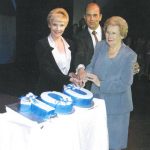
The business of J Jeffries & Sons and William Denys


Jeremy West Receives MBE from Prince William
